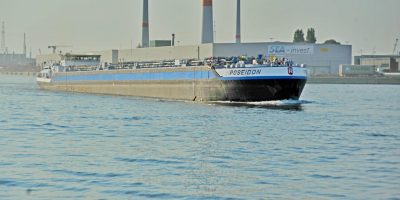
Master Dirk De Beule is the founder and CEO of A-Law advocaten and has been practising law for more than 40 years with an interest in maritime law. In his new book ‘Ship in chains’, he takes a closer look at the arrest of sea-going vessels.
The A in A-Law refers to Antwerp, but the firm has many international ties and also has an office in Shanghai, China. The firm also has several foreign associates. Dirk is a talker when he starts talking about the subject of ‘Ship on the Chain’. Actually, this is originally an Antwerp saying to put a custodial attachment on a ship. Originally, an ocean-going vessel that was being attached would effectively be chained to the quay.
Today, however, a bailiff will seize a number of shipping documents on board the vessel and further take the necessary measures with the various official services so that the vessel cannot leave. A pithy detail: in Antwerp, Greenpeace’s ship Sirius once managed to escape when it was detained (May 1985). Seizure is not only done for financial reasons but can also be done if violations are found, e.g. in employment of personnel or security.
Non-existent address
‘THE 80 BROAD STREET’: the author adds this subtitle, referring here to a non-existent address in Monrovia, Liberia where a lot of ocean-going vessels and maritime companies are registered. Large shipping companies registered at this address are usually reliable but many others are registered there to be able to remain anonymous which can cause problems if those companies run into financial difficulties.
Custodial attachment of vessels is then a solution to make claims true. Usually a seizure is resolved quickly but with companies registered at the said address, the owner may well disappear into the sunset and the vessel will eventually have to be sold; lengthy proceedings are not out of the question here.
Antwerp Convention
The rules contained in an international treaty on the arrest of sea-going vessels (1952) were said to have been worked out by Antwerp lawyers. Antwerp was internationally known as the world’s maritime legal knowledge centre, underlines Dirk De Beule. Maritime jurisprudence was an export product of Antwerp for many years. “We have lost that expertise a bit over the years and we should do everything we can to bring it back to Antwerp. A world port like Antwerp deserves that,” De Beule said.
The CMI (Comité Maritime International) drafted the convention. Its secretariat is still based in Antwerp. A new on the attachment of sea-going vessels treaty appeared in 1999.
The book is not only a reference work but also a workbook, says Dirk De Beule. Eighteen maritime claims are described in it, each of which is extensively detailed with references to national and international laws, court decisions, incidents, etc… The book starts by pointing out restrictions due to international regulations. A 1952 treaty ensured that a unification of some regulations was established internationally. This was a start and treaties followed. Eventually, Belgium systematically amended its legislation dating back to 1908 and finally a Belgian Shipping Code was published in 2018.
The voluminous handbook (430 pages) describes in several chapters how a seizure takes its course from beginning to end. Finally, it also proposes amendments to the current regime. The book ‘Detention of Sea-going vessels: Ship in chains’ can be ordered from publisher Knops Publishing.
Author: Georges Janssens

